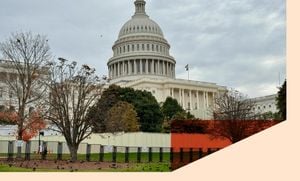Political tensions and economic challenges are intertwining with alarming frequency in India as the country navigates through heated disputes and rising price levels. Just recently, Prime Minister Narendra Modi sharpened his criticisms of the coalition government led by the Jharkhand Mukti Morcha (JMM). During a rally, Modi explicitly targeted Chief Minister Hemant Soren, charging his administration with failing to provide adequate opportunities for the local population, particularly emphasizing the region of Santhal Pargana where many are reportedly compelled to migrate for work due to lack of local development.
Modi's speech highlighted rampant accusations of mismanagement and corruption within the JMM. He drew attention to the dire economic situations faced by local residents, asserting it was symptomatic of wider issues linked to the JMM’s leadership. The Prime Minister seized the opportunity not just to criticize but also to promise development initiatives aimed at transforming the region's energy infrastructure. He unveiled plans for extensive solar energy projects aimed at reducing electricity bills by introducing solar panels to households. This move is part of the BJP's broader strategy to demonstrate commitment to development, as it seeks to bolster its position across India’s political map.
At the same time, political discourse is becoming progressively corrosive. The Congress party, led by figures such as Jairam Ramesh, is vocalizing its frustration with soaring food prices. Ramesh recently lamented how staple items like tomatoes, onions, and potatoes have drastically escalated in price, referring to them collectively as ‘TOP’. He attributed this shocking rise directly to what he claims are failed policies of the Modi-led government, highlighting alarming inflation rates: 161.3% for tomatoes, 64.9% for potatoes, and 51.8% for onions.
Citing these figures, Ramesh urged the Prime Minister to acknowledge the severe burden on ordinary citizens struggling to afford basic groceries. His claims come amid reports mentioning food inflation soaring to double digits and retail inflation climbing to levels not seen in over a year, surpassing the Reserve Bank of India's tolerance thresholds.
The political climate swiftly escalated with opposition parties using the soaring prices to launch fierce attacks. The insinuation is clear—Modi’s administration might be prioritizing other economic interests over the daily reality faced by millions of Indians. Calls for accountability pile up as critics demand answers on why the Modi government seems indifferent to the financial pains of its citizens.
Another significant political flashpoint emerged recently when Maharashtra Deputy Chief Minister Ajit Pawar disclosed Gautam Adani’s presence at key 2019 meetings, raising eyebrows among opposition parties. Ajit Pawar's claim—pointing to Adani’s alleged involvement behind the scenes during government formation talks—has ignited serious accusations of undue influence wielded by corporate interests within the government.
Opposition leaders, particularly from the Shiv Sena and Congress, have seized on these remarks to amplify suspicions around the closeness of the Adani Group to the ruling BJP. Questions are being raised about why business figures like Adani would be present at political negotiations concerning government formation. Critics like Shiv Sena’s Priyanka Chaturvedi suggest this indicated Adani’s deep entanglement with governmental affairs, marking it as potentially dangerous to democratic integrity.
Chaturvedi expressed her dismay over the idea of business entities manipulating political outcomes. She asked rhetorically whether Adani had been appointed as some sort of 'government consultant' by the BJP. The narrative presented by opposition voices suggests extreme wariness of where corporate influence ends and democratic governance begins.
Meanwhile, the economic sphere mirrors these political frictions. The agricultural sector, which forms the backbone of the Indian economy, faces its own tumultuous challenges amid climate change, failing policy interventions, and infrastructural deficits. Coupled with rising costs, farmers find themselves on precarious ground, driving many to protest government decisions linked to agricultural laws.
Further complicity arises from the international economic backdrop, with fluctuated global prices affecting local markets. Economic experts contend India’s inflation woes, particularly within the agricultural domain, may need drastic remedies. They advocate for comprehensive reforms to address supply chain weaknesses exacerbated by both domestic choices and global uncertainties.
Protests burgeoning across various states speak volumes of the discontent brewing among farmers and citizens alike. Recent mobilizations focus on caffeine-related price hikes, fertilizer shortages, and the rising difficulty of accessing subsidized seeds—sparking fears of a broader agricultural crisis on the horizon.
Politically, this brewing unrest signals uncertainty for the ruling coalition as it prepares for upcoming elections. Voters are increasingly attuned to economic grievances, and opposition parties, emboldened by current challenges facing the government, seek to capitalize on these rumbling frustrations.
With the economy grappling with issues of inflation and rising discontent, Modi’s government finds itself on difficult terrain. Leaders within the BJP strive to reconcile economic policies with the pressing demands of the populace, but the road is fraught with obstacles. Action on promises for reform and development must translate beyond rhetoric—failure to do so could jeopardize potential electoral support come the next polls.
Drawing connections between the political upheaval and economic distress exposes the vulnerabilities within India’s current governmental structure, leading many to ponder if voters will prioritize economic stability over political loyalty. The intertwining nature of political discourse and economic realities raises pressing questions about governance, accountability, and the path forward for India.



